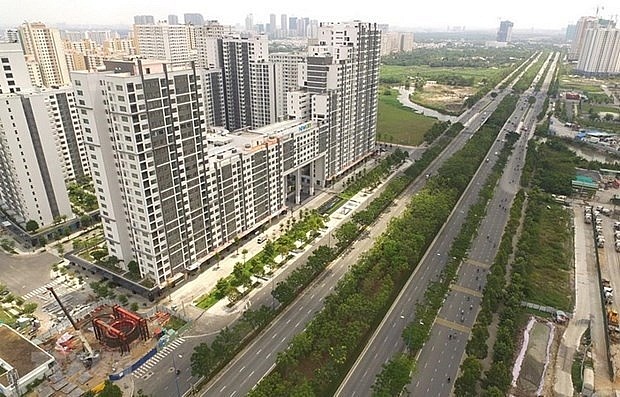Developers clamour for legal clarity
 |
| Developers clamour for legal clarity, Illustrative image (Photo: VNA) |
Nguyen Manh Ha, vice chairman of the Vietnam Real Estate Association, said that tourism real estate needs to break down barriers to development as soon as possible, in order to move alongside the general economic recovery.
“Currently, mechanisms and policies for resort real estate are unclear, especially in terms of new types of real estate such as condotels, officetels, and second-home villas in resorts,” Ha said.
The legal framework has not kept pace with the reality of hospitality and resort real estate development, thus partly hindering the growth momentum of these types of property, Ha added. They are not given a right use certificate, known as a red book in Vietnam, because they are built on land plots permitted for developing tourism property only, and not for residential projects.
Doan Van Binh, chairman of CEO Group, said that supply is scarce not only in Vietnam but worldwide due to the impact of the pandemic. “In addition, legal procedures are inadequate and overlap each other, which makes it difficult for businesses to implement new projects, leading to a lack of supply,” Binh said.
Tourism-resort real estate has been developing quickly in Vietnam over the past decade, and many investors have built resort projects alongside second homes for Vietnamese people or for rent.
Despite strong development, a common voice in terms of regulations has not been reached among the three ministries of construction; culture, sports and tourism; and natural resources and environment.
Condotels and various tourism properties are managed by all three ministries, but buyers are not granted red books because those properties are built on land planned for the purpose of manufacturing and trade, and set up for rent only and not long-term accommodation.
As a result, a series of projects have been entangled, and the resort real estate market has all but frozen in many localities after a previously hot development period.
To remove bottlenecks and create conditions for tourism and resort real estate development, Ha said, the government should release a document after consulting the National Assembly Standing Committee on how to apply the current law to solve the problems. “This would also be the basis for thoroughly amending relevant legal documents,” he said.
In the long run, to open up the tourism and resort real estate market and develop tourism, Ha added that it is necessary to have an effective policy to attract investment capital, which must bring benefits for all related parties and ensure increased revenues for the state budget.
“If condotels and resort real estate are treated in a more long-term manner, they would become more of an attraction for both developers and investors,” Ha added.
The current Law on Land has no regulated policies for condotels and resort villas. Developers in some localities have not reserved land plots for building essential public services such as schools, clinics, and markets, but still ensure convenient services for tourism such as sports, entertainment, and leisure activities. This type of land cannot be issued with a red book because it does not have essential services for the common residential area.
Doan Hong Nhung, deputy head of the Legal Department of Vietnam Real Estate Association, said while waiting for amendment of the 2013 Law on Land, it is possible to correct existing inadequacies and problems via under-law documents, such as decrees or joint circulars on the issuance of land rights certificates.
“This will help the market smoothly utilise the potential of land and attract foreign capital, helping the market develop transparently and effectively. If the legal obstacles are removed, surely tourism real estate products will continue to flourish,” Nhung said.
Hospitality and resort segments will still mainly rely on solid domestic tourism demand, but the gradual piloting of localities in welcoming foreign guests is a good opportunity to contribute to the recovery of Vietnam's tourism market at its fastest speed.
| According to the Vietnam Real Estate Association, as of September 2021, a total of 239 tourism real estate projects with more than 114,000 condotel apartments, valued at more than VND297 trillion ($12.9 billion) were reported in 15 provinces and cities. Of those, 24,400 tourism villas valued at $10.6 billion and nearly 31,000 shophouses with a value of $6.69 billion were present in the 15 localities, which include Quang Ninh, Haiphong, Danang, Nha Trang, Ba Ria-Vung Tau, and Phu Quoc Island. The total value of all these properties was roughly $29.6 billion. Of this, about 100,000 condotels were not certified according to the provisions of the Law on Land. |
| Dang Hung Vo-Former Deputy Minister Ministry of Natural Resources and Environment
If Vietnam wants to become a tourism powerhouse, it needs to encourage tourism property. Removing legal difficulties in the direction of creating attractive benefits to attract a variety of investment capital is the key to creating the driving force for this type of real estate. At the end of 2019, the market witnessed turmoil when some large real estate developers broke their profit commitments, claiming that they could not fully pay the promised profits to customers and investors. The exploitation and operation of resort activities were not effective, only reaching 5-6 per yield while the promised profit level had been up to 12 per cent. On the other hand, the legal status of condotels is not clear. Therefore, some investors were forced to convert their condotels into residences. This activity was then prohibited and the tourism property segment collapsed as it could not raise capital. It hasn’t been any easier during the pandemic era. And while the government has now allowed the full opening of tourist activities, the old story of the lack of a legal framework returns. No matter how much the tourism industry recovers and creates opportunities for tourism and resort real estate to grow again, it is not possible to remove bottlenecks in raising capital from secondary investors without a complete legal framework. On the contrary, if the tourism and resort sector does not have the capital to develop unfinished projects, it will not be able to improve the quality of accommodation services. As a result, a series of projects have been delayed. Prolonged disputes have persisted between project developers and their buyers because developers cannot obtain a long-term certificate. Investors suffered great losses while buyers were upset. We should learn from the experience of other countries which are levying taxes on the duration of land ownership and demand. Buyers could be exempted from tax for the use right certificate for a number of years, a regulation that is applied in China, Singapore, and Israel. |
What the stars mean:
★ Poor ★ ★ Promising ★★★ Good ★★★★ Very good ★★★★★ Exceptional
 Tag:
Tag:
Related Contents
Latest News
More News
- An Phat 5 Industrial Park targets ESG-driven investors in Hai Phong (January 26, 2026 | 08:30)
- Decree opens incentives for green urban development (January 24, 2026 | 11:18)
- Public investment is reshaping real estate’s role in Vietnam (January 21, 2026 | 10:04)
- Ho Chi Minh City seeks investor to revive Binh Quoi–Thanh Da project (January 19, 2026 | 11:58)
- Sun Group launches construction of Rach Chiec sports complex (January 16, 2026 | 16:17)
- CEO Group breaks ground on first industrial park in Haiphong Free Trade Zone (January 15, 2026 | 15:47)
- BRIGHTPARK Entertainment Complex opens in Ninh Binh (January 12, 2026 | 14:27)
- Ho Chi Minh City's industrial parks top $5.3 billion investment in 2025 (January 06, 2026 | 08:38)
- Why Vietnam must build a global strategy for its construction industry (December 31, 2025 | 18:57)
- Housing operations must be effective (December 29, 2025 | 10:00)






















 Mobile Version
Mobile Version